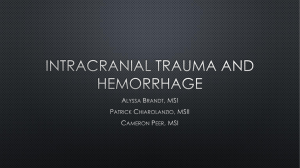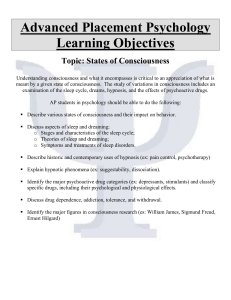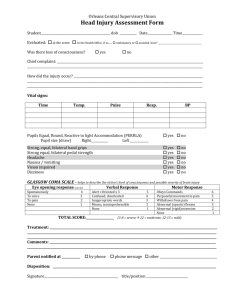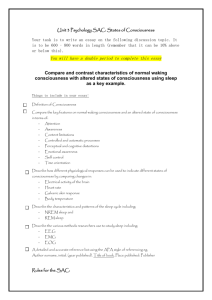Psychology Warm Up November 7, 2011
advertisement
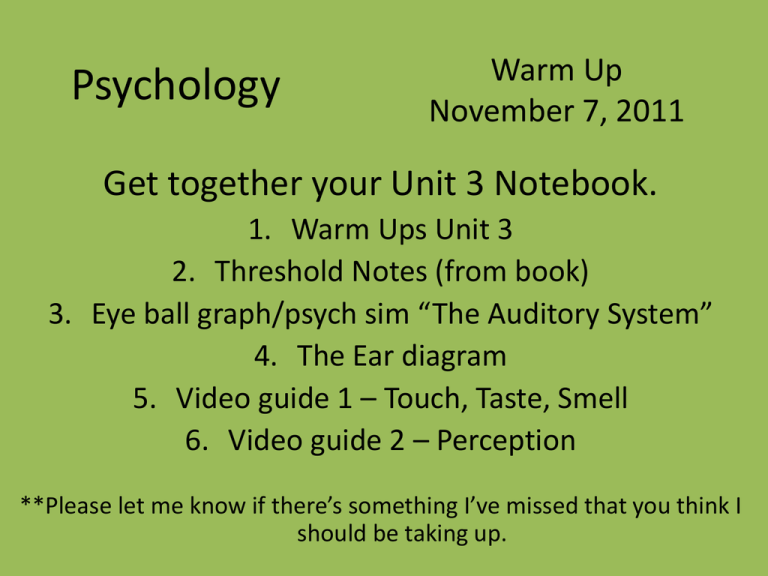
Psychology Warm Up November 7, 2011 Get together your Unit 3 Notebook. 1. Warm Ups Unit 3 2. Threshold Notes (from book) 3. Eye ball graph/psych sim “The Auditory System” 4. The Ear diagram 5. Video guide 1 – Touch, Taste, Smell 6. Video guide 2 – Perception **Please let me know if there’s something I’ve missed that you think I should be taking up. The Study of Consciousness • Main Idea – Consciousness, the awareness of things that are both inside and outside ourselves, is an elusive but essential subject of study for psychologist. • Question – Why is consciousness a psychological construct? • Question – What are the general meaning of consciousness? • Question – What distinguishes the different levels of consciousness from full consciousness awareness? Consciousness as a Construct • Construct – the study of something (in psychology) by scientists (psychologists). • Consciousness awareness of things inside and outside ourselves. • Psychologists believe your cannot capture the true human experience without understanding consciousness. Meaning of Consciousness • Multiple meanings for sensory awareness. • Consciousness means awareness but is used in multiple ways. • Sensory Awareness – you are constantly aware of what’s going on around you because of your senses. • (ie the smell of pizza, teacher’s voice, seeing the notes on the board.) • Selective Attention – focusing on a particular stimulus. This make your senses more keen and you become aware (conscious) of changes in the room. • To pay attention in class you must tune out the rustling of papers, moving of chairs, pencil sharpener. Meaning of Consciousness • Imagine jumping into a lake or swimming pool on a hot day. Can you feel the cool water around you? • You are not directly experiencing this, you do know what it feels like. • Direct Inner Awareness – feeling of emotions, thoughts, memories, etc. that your are aware of but not directly experiencing. – Ie. feeling angry when a friend says something upsetting, remembering how the cool water of pool/lake feels on a hot day, etc. Meaning of Consciousness • Have you ever noticed how young children refer to themselves by their names? • Consciousness as sense of self – aware of ourselves and our surroundings. • Eventually young children become aware of themselves and their surrounding and hoe each are impacted by actions. Different Levels of Consciousness 1. Consciousness – being aware of your thoughts and perceptions. 2. Pre-consciousness– ideas are not in your awareness, but you could recall them. (What happened at school yesterday? What did you have to eat for dinner last night? Etc.) 3. Unconsciousness levels – unavailable to awareness under most circumstances. (You may not want to go to something you made plans to attend, a party. As you get ready you are constantly distracted. You are distracted b/c you were UNAWARE you didn’t want to attend the party.) Different Levels of Consciousness 4. Non-consciousness level – basic biological level. Your fingernails or hair growing, pupils growing larger or smaller adjusting to light, etc. 5. Altered states of consciousness – person’s sense of self or world view changes. Sleep is one example when you doze of you are no longer aware of what’s going on around you. Meditation, drugs and hypnosis are other examples. Freud’s Levels of Consciousness Conscious Level Preconscious Level Unconscious Level Fill in examples under each of the following sections. Dream Journal On a separate sheet of paper write the following, leaving space in between. Sunday Time Asleep Time Awake How did I sleep? Did I dream about anything? Monday Time Asleep Time Awake How did I sleep? Did I dream about anything? Tuesday Time Asleep Time Awake How did I sleep? Did I dream about anything? Wednesday Time Asleep Time Awake How did I sleep? Did I dream about anything?
